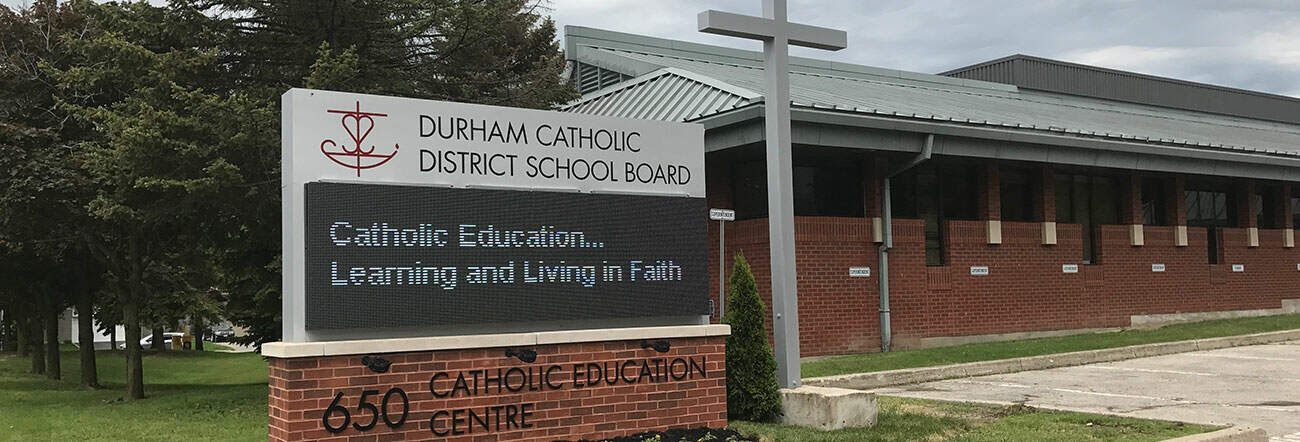Durham Catholic Board apologizes for controversial anti-racism policy
Published July 4, 2022 at 5:24 pm

Weeks after approving an anti-racism policy that removed references to white supremacy and colonialism, the Durham Catholic District School Board (DCDSB) said they’re “sorry to have hurt members of our community.”
The initial draft of the policy forwarded by DCDSB included definitions of a variety of topics such as white supremacy, microaggressions, colonialism, intersectionality and others.
These definitions proved controversial for some on the board and in the public for perceived similarities to the language of Critical Race Theory (CRT).
This academic discipline seeks to examine racial and cultural relationships through a lens of scholarly criticism. CRT emerged in the 1970s as historic civil rights legal victories from the 50s and 60s began to be eroded.
Ultimately numerous legal scholars from schools such as Harvard and Cornell began examining American law and institutions through a critical lens.
They came to the conclusion that racism and its negative effects are more a result of institutional issues than individual biases. Overtime CRT methods grew into a academic movement used to examine a host of fields such as education, political science sociology and others.
It posits as well that while race is a social construct, it is a construct that must be considered when developing social policies. ‘Color-blind’ programs and policies, proponents argue, do more harm than good and advance discriminatory practises.
For some 40 years CRT remained the subject of scholarly articles and academic debate, though not without controversy. However President Donald Trump adopted attacks on CRT as a major campaign theme bringing the theory more prominently into the public eye.
He characterized the theory as “un-American propaganda” a position adopted by numerous right-wing think tanks, advocates and state-legislatures. These opponents to CRT often characterized it as an example of “reverse racism” directed against white people.
Numerous states have since banned CRT discussion and education from public schools. However often this often includes works not directly related to CRT.
This controversy has extended up past the Canadian border influencing policies in this country as well, albeit to a lesser degree. Much of the opposition to the DCDSB anti-racism draft policy involved these concerns.
Writing for ByBlacks, an outlet for Black writers, Roxanne Francis, a parent of a DCDSB student, says she asked the new DCDSB Human Rights advisor why the definitions were scrapped from the draft.
“He noted that at the final reading on May 9th,” Francis wrote, “members of the public expressed concerns about some of the language and that the trustees allowed the amendment in order to ‘protect the interest of members in the community’ knowing that there will be a review in the Fall.”
In a later follow-up from the board Francis was told the Trustees had ‘received several electronic communications from members of the public urging them not to pass the policy as written, alleging that language was not consistent with Catholic teachings.”
As a result of this push-back the Board removed any references in the policy to terms used outside of the law including CRT scholarship.
DCDSB Board Chair Morgan Ste. Marie and Director of Education Tracy Barill released a joint statement on June 28 saying, the board had “heard the concerns” about the interim Anti-Racism Policy from the Black community in Durham Region and the general public.
“The DCDSB remains genuinely and irrevocably committed to equity, the elimination of all forms of racism and discrimination in the board. Having seen and heard the comments regarding the interim policy from May 9, 2022, Board Policy Meeting, we understand that this has hurt students, families, staff, and the community.”
Francis was not impressed by this apology. “This is insulting. The DCDSB community has been waiting for over a year for a strong Anti-Racism Policy. Waiting a few more months to create an acceptable policy would not have been much of a stretch. It is clear that these statements are a result of a PR spin as the DCDSB tries to manage its sullied reputation.”
The current policy was carried as an interim policy set for review when the next school year begins.
insauga's Editorial Standards and Policies advertising





